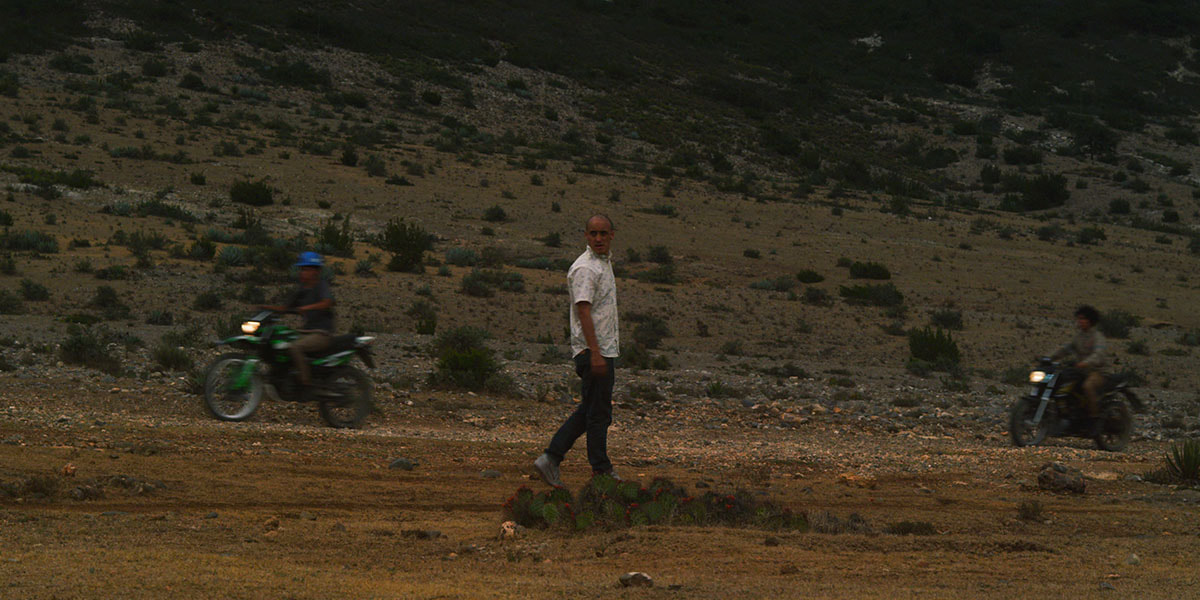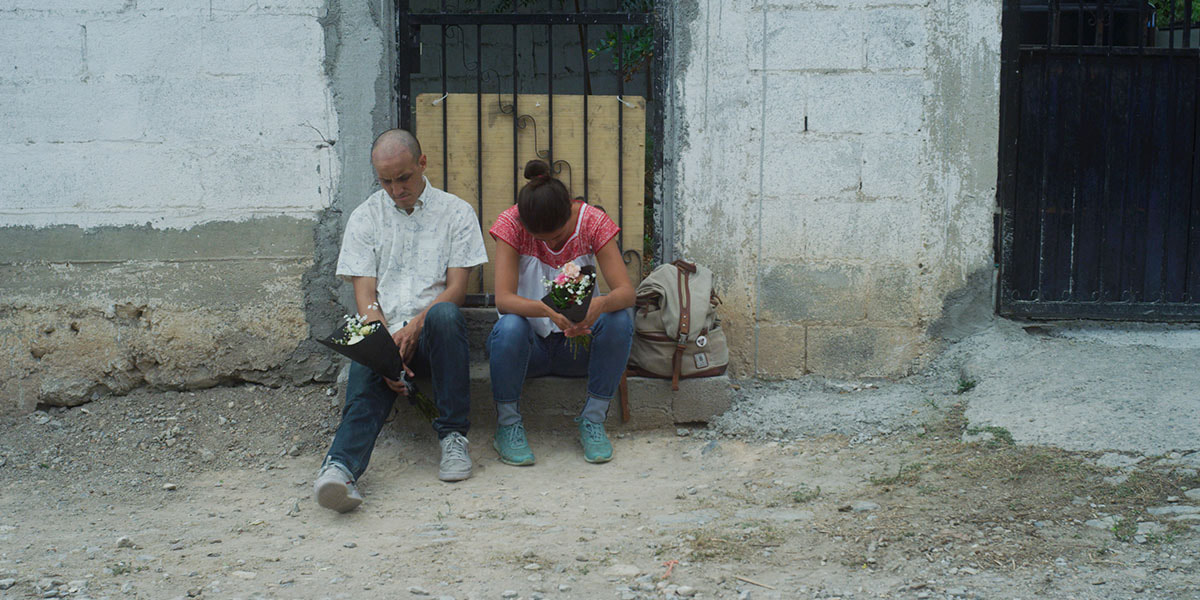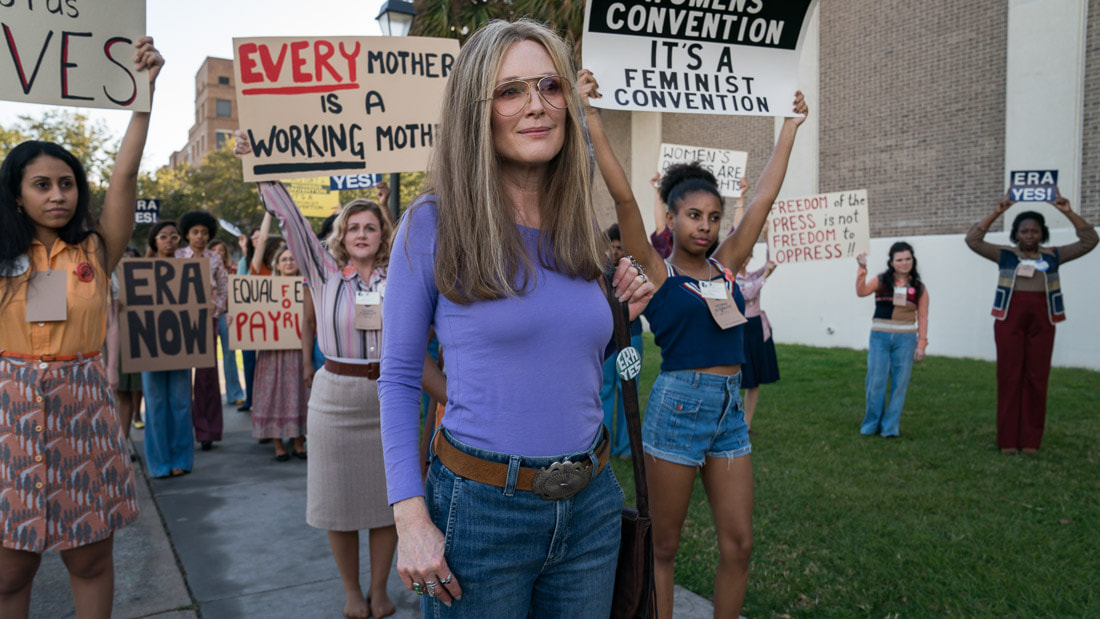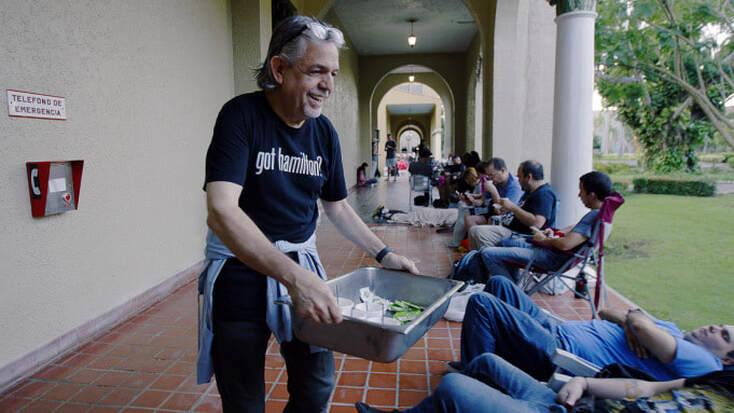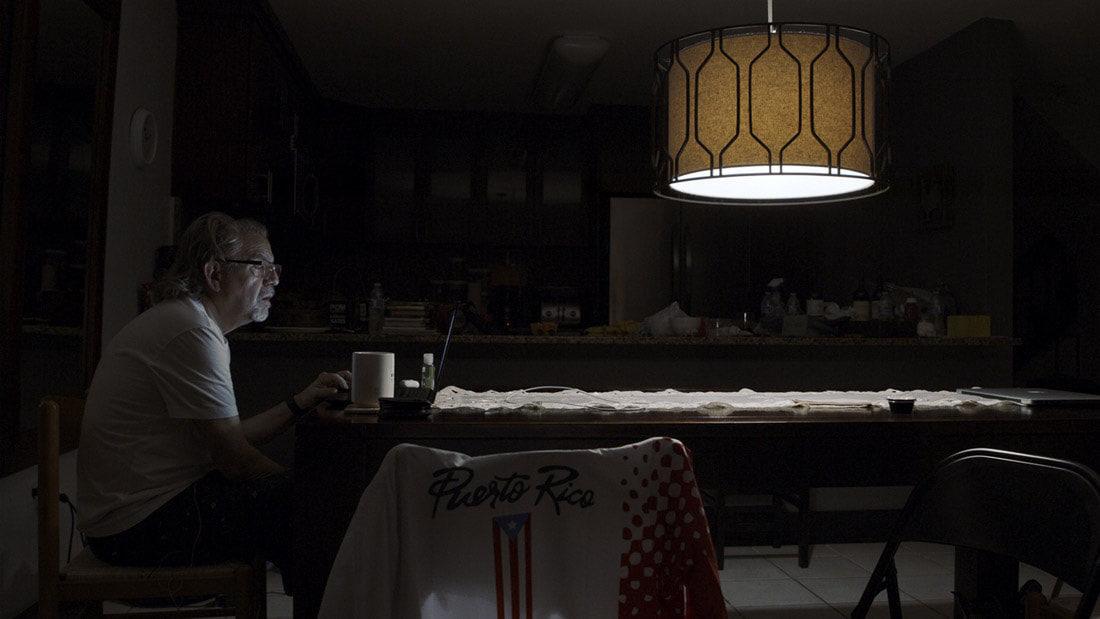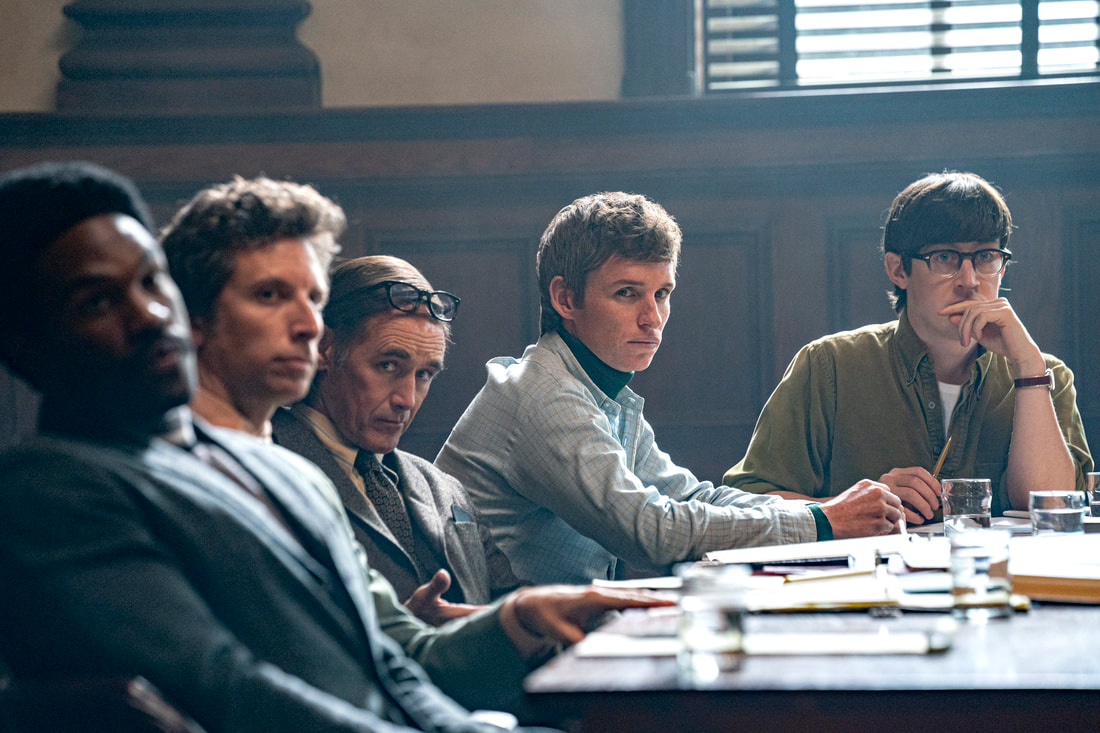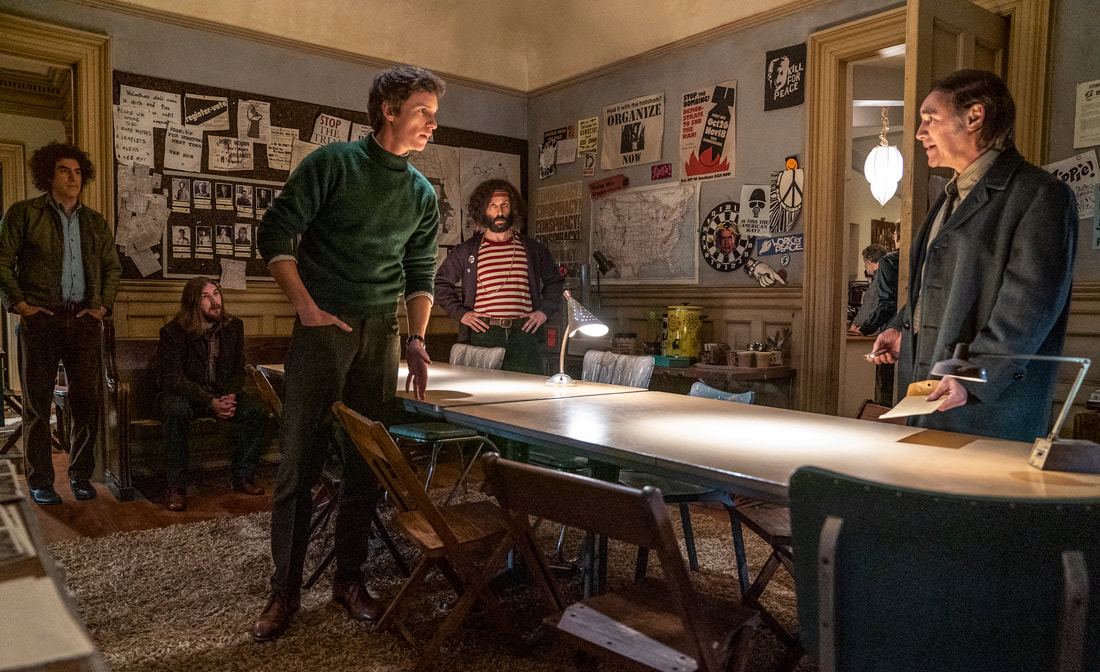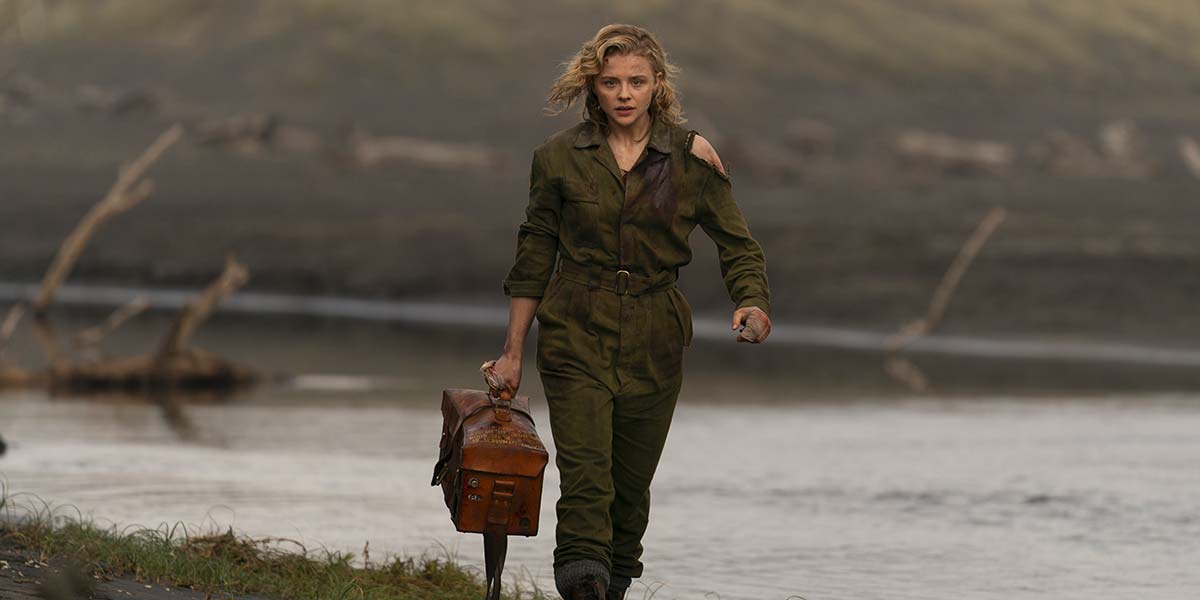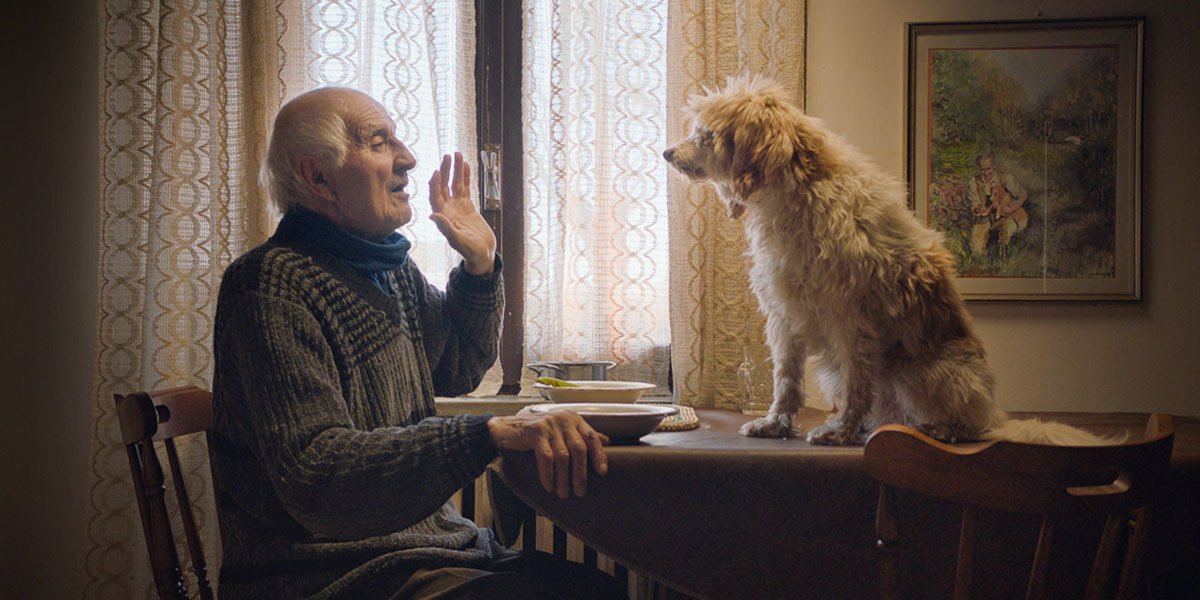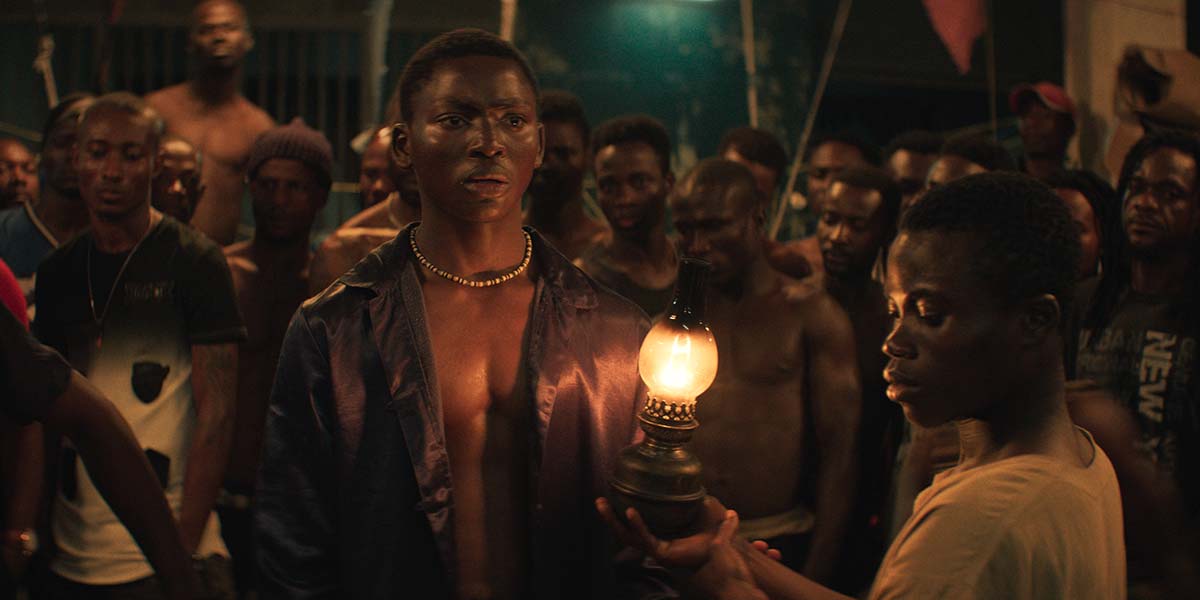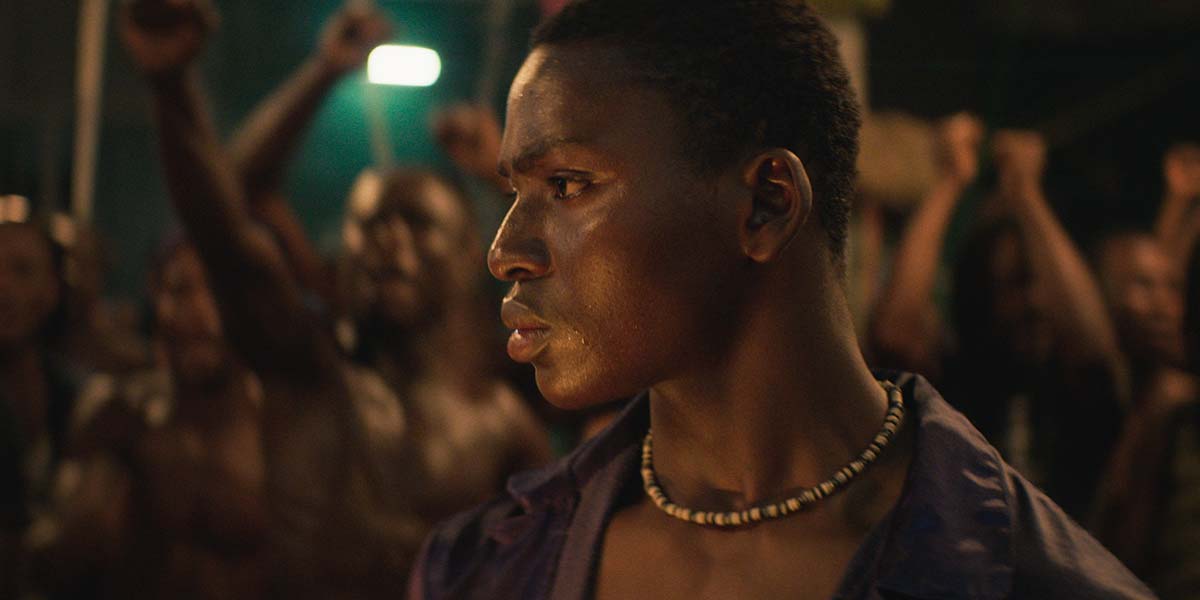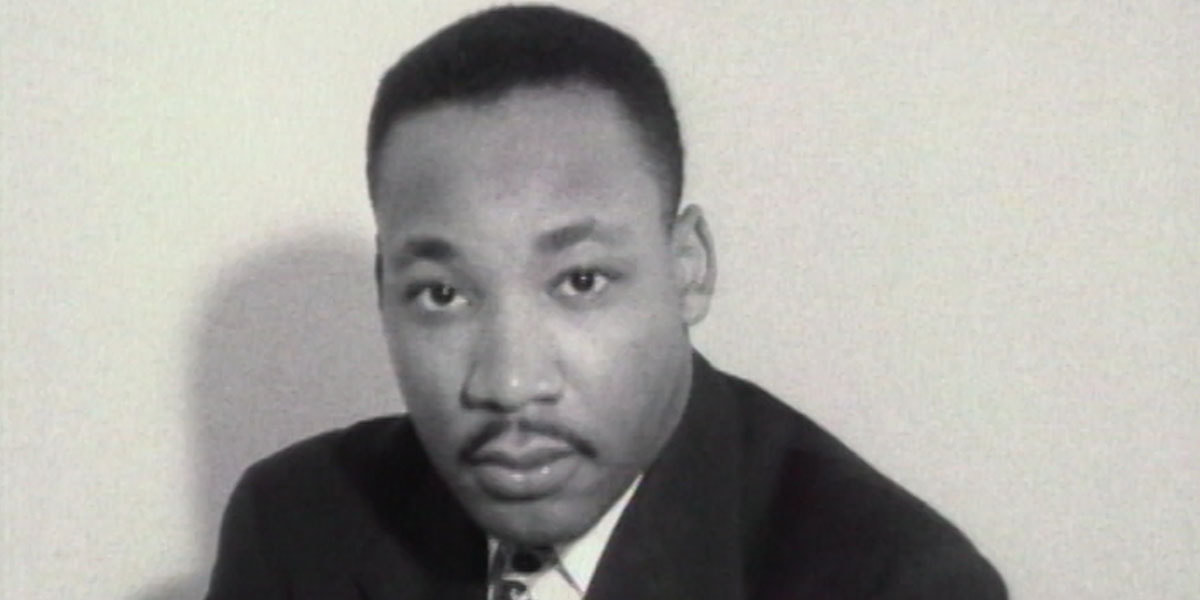|
Review by Sean Boelman
Nicolás Pereda’s film Fauna exists on a weird plane where it is not quite abstract enough to be considered avant garde, but certainly can’t be defined by traditional narrative standards. Boiling down to an interesting experiment in filmmaking but not much else, one is left to question if this movie really even has an audience, and if so, how will it serve them?
The film takes place over the course of an awkward family reunion as tensions arise and some of the family members find themselves intrigued by the arrival of a newcomer into their unit. It is very loosely a dysfunctional family comedy, but Pereda’s script is not held back by the genre’s tropes, settling in a place that is vaguely familiar if not entirely comfortable. Even though the runtime is only an hour and ten minutes, that brief length is packed from start to finish with dialogue. Whether it goes by quickly or slowly will depend on how much attention one is willing to pay to the intricacies and references of Pereda’s script, and whether they appreciate his dry sense of humor. Perhaps the most frustrating thing about Pereda’s movie is that it is all over the place thematically. There are obviously some really interesting things going on in the script, like his commentary on the role of violence in the media, but then it heads off on a tangent that isn’t as profound or well-developed as the main matter at hand.
The character development in the film is also rather underwhelming. Pereda seems more interested in what the characters have to say instead of how their words reflect on them. As a result, Pereda’s profound observations on society turn into something shallow and distant that feels like it is offering insight without any real application.
Francisco Barreiro is clearly the highlight of this movie. Playing a character with some obvious meta-commentary ties to his popular role in the series Narcos: Mexico, Barreiro has the juiciest part with the meatiest dialogue. Luisa Pardo is also solid in her role, but she is given much less substantial material to work with than Barreiro. On a technical level, the film is rather straightforward. It’s disappointing that Pereda didn’t go for more of a confined thriller style for his heavily dialogue-driven piece. Nothing looks bad — in fact, it is quite the opposite — everything almost looks too nicely polished for a movie that seemingly wants to be gritty and edgy. Fauna doesn’t have enough of a conventional narrative to be satisfying in that regard, but is also not ambitious enough to work as an avant garde film. Despite a few things working in its favor, viewers will largely be left wanting more from this disappointing mash-up. Fauna screened as a part of the 2020 Toronto International Film Festival which ran September 10-19. Review: 3/5
0 Comments
Review by Sean Boelman
The adjective “timely” gets thrown around a lot in film criticism (this critic will even admit to sometimes overusing it), but there hasn’t really been a movie to be made about a moment in the moment and released while that moment is still happening. And while the documentary 76 Days shows some obvious signs of rushed production, it will be the time capsule of what it meant to live during the COVID-19 pandemic.
The film follows the patients and medical workers dealing with the coronavirus in Wuhan, China, the original epicenter of the pandemic. Assembled from footage collected from the front lines, the movie puts audiences up close with those experiencing the effects of this virus firsthand, a much more personal experience than watching the same stock images that cycle through the news. It’s really a miracle that this film was even made with the tight control over the media in China. The filmmakers and participants should be praised for their bravery in telling these stories that need to be told. It’s not an easy watch — some of the things presented here are truly horrifying, and others are terribly sad — but it’s one that needs to be seen nevertheless. Admittedly, the movie does become repetitive at a certain point and one has to wonder whether this would have been more successful as a short than a full feature. Still, there is something to the general chaos of the film that is fitting. It’s an “unprecedented situation” (another buzz word), and these people have no idea what to do.
The frenetic run-and-gun style adopted by the filmmakers works at first because the viewer will know that this movie was made quickly and on-the-fly, but the anxiety it causes soon becomes very tiresome. Perhaps this is the point, especially given the fact that so many municipalities are beginning to ease their preventative measures, but the near-panic tone is a bit aggressive.
The film also falls short in giving the audience a particular subject to call the hero. And while this can partially be attributed to the safety of everyone involved and partially to the fact that this movie is very much made in haste, it still lacks the focus it needs to be more than general gloom and doom. It’s clear that the filmmakers want this to be a work of activism. Made by filmmaker Hao Wu, journalist Weixi Chen, and another anonymous contributor, the film is meant to be seen by as many people as possible. And hopefully at some point in the near future it will be made available without the limitation of a paywall, as this is what is needed to ensure it reaches those who need to hear this message. It would be safe to say that 76 Days is undoubtedly the single most urgent film of this year’s festival circuit. It’s not the first COVID-19 documentary, it certainly won’t be the last, and it may not be the best, but it’s what we have right now so people need to see it. 76 Days screened as a part of the 2020 Toronto International Film Festival which ran September 10-19. Rating: 3/5
Review by Sean Boelman
Frederick Wiseman is considered to be one of the most influential filmmakers in the direct cinema style of documentary filmmaking, and even as a nonagenarian, he’s still one of the most interesting voices working today. And while his newest film City Hall may be long, it’s powerful stuff and should be considered essential viewing.
The movie takes a look at the Boston city government, with the city used as a representation of American democracy at large. From City Council meetings that get surprisingly heated to public housing inspectors going on their checks, Wiseman turns his camera on all of it to show how these institutions work on even the most miniscule level. Those viewers who are less adventurous may find themselves put off by the film’s four-and-a-half hour runtime, and honestly, it’s understandable. Watching government proceedings for nearly five hours probably isn’t anyone’s first choice of entertainment, but Wiseman is such a talented filmmaker that he manages to make it riveting. The style that defines Wiseman’s movies is one that is as detached and objective as possible. Of course, there is something very clear that Wiseman wants viewers to get out of his film, but this is achieved through editing rather than narration or guided interviews. When done right, it can have very impactful results, and as expected, Wiseman’s movie succeeds.
Admittedly, the outlook the film has on the American government is pretty bleak. There are certainly people who want to do right by their people and their power, but American politics have become such a joke that those people can’t even do their job well. One of the most harrowing scenes in the movie features a public forum that is revealed to be entirely ineffective.
Boston Mayor Marty Walsh is the de facto hero of the film as he tries to keep the different moving parts in the government aligned and working. But in doing so, Wiseman loses track of the most compelling aspect of this story: the people of Boston, those who are affected most by the shortcomings of this local government. The movie also encourages the viewer to take a more active role in their government at all levels. Of course, it is important to vote because that is the easiest and most basic thing a person can do to have their voice heard. But Wiseman purports that there are other simple ways to bring about change, and it is important for people to get invested in solutions as much as they are invested in problems. City Hall is a pretty magnificent documentary, although it is obvious why it isn’t going to be for everyone. Hopefully this will be the film that finally gets Wiseman his long-due attention from the greater public. City Hall screened as a part of the 2020 Toronto International Film Festival which ran September 10-19. Rating: 4.5/5
Review by Camden Ferrell
Upon hearing the word “feminism”, many people will likely think of Gloria Steinem. She is a feminist icon, journalist, and one of the most revolutionary activists of the last few decades. The Glorias is the newest movie from Julie Taymor (Frida), and it is based on the book My Life on the Road by Steinem herself. While this movie has a great cast and subject, it often comes off as bloated and not as revolutionary as the Ms. Steinem.
In this film, we are taken on a reflective road trip through Steinem’s life. We see her childhood and how it eventually got shaped into her influential and radical adulthood. The movie portrays her efforts as a journalist, a feminist, and as a cultivator of change. She led and continues to lead a great life, and it’s a great foundation on which to build this movie. The script is mostly adequate. Written by Sarah Ruhl and Taymor, a lot of it is standard biopic material. Not to say its inept, a lot of it is actually quite enjoyable, but it falls into the same traps as other films of this genre. It has its occasional great interaction and witty one liner, but it doesn’t do enough to inject energy into this film. The most outstanding aspect of this film is its performances. Gloria is played by four actresses of different ages. While the child actors are great, the real show stealers are the two adult Glorias. Alicia Vikander (The Danish Girl) plays Gloria in her 20’s, and she perfectly embodies this role. She acts with such empathy and conviction, and she handles a wide range of scenes well. The latter half of the film rests primarily on the shoulders of Julianne Moore’s (Still Alice) Gloria. It doesn’t reach the heights of Vikander’s performance, but it’s another amazing performance to Moore’s already impressive career.
The most noticeable flaw of the film comes from its runtime. It’s a hefty movie that clocks in at nearly two and a half hours, and it doesn’t do enough to completely justify that distinction. There are plenty of scenes that could have been cut or reduced, and some parts feel far less consequential than others. It was slightly unorganized, and it could have benefit from some more edits.
While the movie has a retrospective and somewhat non-linear progression form the start, it makes some daring choices in the film’s final half. Taymor is no stranger to these artistically expressive and daring moments, but it’s an attribute that isn’t entirely consistent in this film. It’s a refreshing change of pace, but these moments stand out, and it disrupts the film’s natural rhythm. Regardless of its flaws, this is still an informative film about the life of Gloria Steinem. There’s plenty to learn for all ages, and it’s an inspiring film that establishes its social relevance in today’s current social climate. It’s a film that tells the story of one leader as a vehicle to hopefully incite change and inspire a new generation of feminists. The Glorias may be overly long, and it may blend in with other biopics, but it’s still a great showcase for its leading actresses. It is another decent movie from Taymor, and it’s an enjoyable film for a general audience despite its R rating. The Glorias is available on Amazon Prime beginning September 30. Rating: 3.5/5 Review by Dan Skip Allen A lot of celebrities get in the spotlight and their relatives, parents, sisters and brothers, and grandparents, get left out of the limelight. Occasionally a sibling team such as the Gyllenhaals become famous together or a father-son duo such as Kirk and Michael Douglas both break out as big-name actors. In the music world, Robin Thicke broke out of his father's shadow and paved his own road. Most of the time they are in obscurity relating to family members. That's not the case with Louis Miranda, father of broadway sensation Lin-Manuel Miranda. He stands in no one's shadow. He even made a name in some circles before his son ever came to fame. Miranda is a Puerto Rican immigrant. Born and raised in a little town Puerto Rico, he always had aspirations or big dreams to leave his native country. So he came to New York, leaving everyone he knew behind. Always a man of conviction, he wanted to represent his fellow Latinos in New York. He became a voice for his people in the heights where he lived. Word got out how important he was in the Latino community and so this led to a career in politics for Louis. Ed Kotch recruited him to his campaign for Mayor of New York in the early '80s. And this became his job from then on, representing the Latino community in elections for many years to come in New York. His job also eventually included helping Chuck Schumer and Hillary Clinton. He even went on the road to Florida to help in many elections there. His wife and sons were always part of his life. Like most fathers, he was a huge part of his children's lives, even the ones that became worldwide sensations like Lin Manuel Miranda. Lin-Manuel's first Tony for In the Heights brought his father a lot of pride but his next project Hamilton brought White House visits and worldwide acclaim. Lin-Manuel still couldn't get out of his father's shadow, though. He became an activist for his former country of Puerto Rico after it was hit by a Category 5 hurricane, Maria, in 2017. He continues his activism and assistance for the Democratic party today as this review is being written. As someone who represents something, he stands for issues that many people can get behind. In a state full of Latinos, I can attest to the fact that this is a huge demographic in this country. More and more Latino leaders are popping up. Louis was doing this work decades before people realized it was important to do so. Latinos represent a huge part of the countries population now. Some states like Texas, Arizona, and Florida are a huge voting base for politicians to get on their side.
Documentaries have to tell a story that is engaging and interesting. Of course, the talking heads are essential in documentaries. Louis's family is the main focus of this doc, but his history in video footage is the meat and potatoes of the film. Filmmaker John James achieves the goal of the film — to get the message of how important this man is in the Latino community and how important his work is. What he accomplished in New York and the country as a political consultant is beyond incredible. Added to what he did for Puerto Rico, he led an incredible life. Look no further than Siempre, Luis for a must-see for anybody looking for inspiration to go do something for your town, state, or country. Siempre, Luis screened at the Urbanworld Film Festival which runs September 23-27. Rating: 4.5/5 One of the writers from disappointment media worked on a film playing as part of the Dances with Films Festival, but they were not involved with the writing of this review.
Review by Sean Boelman
The newest film from master screenwriter Aaron Sorkin, and his second time in the director’s chair, The Trial of the Chicago 7 is arguably the filmmaker’s most restrained work yet. Still packed with plenty of his signature quick dialogue but with more intricate character work than expected, it is as good as one would expect.
The movie tells the story of a group of men who are tried for charges related to a protest-turned-uprising at the 1968 Democratic National Convention in Chicago. Sorkin takes the structure of a fairly standard courtroom drama and makes it his own into something more riveting and emotional. Most of the story is told through the frame of the court case, with flashbacks during the testimony serving to provide the necessary context for the story. After an absolutely killer introduction that uses archive footage and character introductions to establish the stakes, Sorkin throws the audience right into the trial to exciting effect. Admittedly, the film does fumble some of its weightier themes. The portion of the movie exploring racial injustice is interesting, but is solved by the midway point. And given the context of recent events, complaining about the shortcomings of the justice system for seven white characters, while still affecting, feels like too little too late.
That said, the film does a very good job of developing most of its nine main characters. Unfortunately, the most compelling aspect of the story, involving Bobby Seale, the co-founder of the Black Panthers, is the most underdeveloped. But when it comes down to the actual Chicago 7 and their lawyer, the movie is very well-done.
The single biggest thing working in this film’s favor, though, is its tremendous ensemble. All of the performances in this are amazing. Recent Emmy winner Jeremy Strong is arguably the biggest standout, giving the most nuanced performance of the bunch. Eddie Redmayne is a close second, having the most powerful scene in the movie. And Sacha Baron Cohen, John Carroll Lynch, and Mark Rylance are all excellent as well. As was the case with his debut, Sorkin shows here that he isn’t quite as strong of a director as he is a screenwriter, but he brings a lot of energy to the table regardless. But there are some decisions made that were somewhat distracting. The wig worn by Mark Rylance, for example, is terrible. There are some scenes that cut too early before the emotion of the performance can really set in. And Daniel Pemberton’s score often feels a bit heavy-handed. Despite a few small issues, Aaron Sorkin’s The Trial of the Chicago 7 is a brilliant thriller with one of the year’s best ensembles. It’s both a movie of the moment and a great historical work, offering the best in both social commentary and crowd-pleasingness. The Trial of the Chicago 7 streams on Netflix beginning October 16. Rating: 4.5/5
Review by Sean Boelman
The Midnight Madness section at the Toronto International Film Festival is known for bringing at least one entry that is so bonkers and off-the-wall that one can’t help but enjoy it. And despite the category being slimmed down to only three selections this year, it definitely delivered with Roseanne Liang’s badass action-horror Shadow in the Cloud.
The film follows a young female pilot travelling onboard a WWII cargo flight with a classified mission involving a sensitive package as she and the plane’s crew discover that there may be an unexpected stowaway throwing a hitch into their plans. Starting with a tongue-in-cheek introduction, this feels like the creature features of yore in all the best ways. Liang’s film is a very minimalistic thriller, and it’s enormously entertaining for the entirety of its brief runtime. The first forty-five minutes trap the audience mostly in a small chamber with the protagonist with dialogue delivered through the radio, before the last half-hour goes absolutely nuts in a chaotically energetic way. Apart from a few shots that very obviously used green screen effects, the film looks pretty great. Even the CGI for the monster looks really cool. But the more impressive elements of the execution are the ways in which Liang takes advantage of her limitations, by creating tension within the confined location of the cargo plane. There are definitely some issues with the script, like a third act twist that is rather anticlimactic, but for the most part, it’s a ton of fun. The over-the-top misogyny and machismo is probably the scariest thing in the film, but it’s also some excellent satire and a wonderful way for Liang to reclaim her film given its origins. The character development in the film is one of its greatest weaknesses. Disappointingly, there isn’t much of an arc, with the protagonist going from a mysterious drifter to a powerful heroine in what seems to be an instant when a reveal is made. And all of the supporting characters are basically caricatures (albeit in a funny way). That said, Chloë Grace Moretz absolutely owns this film. She made her big break with a performance in a cheeky action flick, so it’s nice to see her getting to return to the genre. Her screen presence is phenomenal, and she handles the action sequences, especially the last one, in a way that is awesome. Shadow in the Cloud may not be the most intelligent film to come out of this year’s festival circuit, but it’s a hell of a lot of fun. It’s a popcorn flick that has a ton of rewatch value because it’s mindlessly enjoyable. Shadow in the Cloud screened as a part of the 2020 Toronto International Film Festival which ran September 10-19. Rating: 4/5
Review by Sean Boelman
A food doc that isn’t really a food doc, Michael Dweck and Gregory Kershaw’s The Truffle Hunters is a surprisingly hilarious film. Shot in a spectacular and almost narrative-like fashion, this documentary uses the eclectic personalities of its subjects to create an absolutely captivating story.
The movie follows a group of older men who live in the forested areas of northern Italy searching for rare (and expensive) truffles with the aid of their canine companions. But there is a lot more to this story than people foraging for fungi — it’s about a culinary artform and the unexpected economic market that sprung up around it. The pacing of the film is certainly unorthodox, but in a very good way. It’s a story that, on paper, seems like something people wouldn’t care about. Outside of the upper class or those who are deeply interested or trained in the culinary arts, few would know about this delicacy, much less care about how it is harvested. And yet Dweck and Kershaw are able to milk some interesting drama out of this story. Some of the most interesting portions of the movie explore the relationship between the different foragers and how they each have their own methods of hunting. Some of them are surprisingly (or perhaps unsurprisingly, given how valuable each truffle is) territorial over their “hunting grounds”. Other portions of the film that are fascinating explore the impact of the truffles after they hit the market. One of the best scenes in the movie shows some people as they describe the smell of different truffles as if they are sommeliers describing a distinctive bottle of wine. This only goes to show how absurd this truffle culture really is. Of course, a big draw for this film for mainstream audiences will be the dogs that the harvesters have trained to locate the rare truffles. Although the relationship between the animals and their caretakers is treated as secondary to the main focus on the truffle market, it’s still compelling and very cute. What really pushes this film over the top, though, is how beautiful it is. Yes, the offbeat sense of humor and the intriguing world it explores are the cake itself, but the icing is the gorgeous cinematography. Even in the most straightforward of moments, such as two people sitting at a table, the framing is impeccable. The Truffle Hunters does a lot within its short runtime, and it’s extremely interesting as a result. It’s a deliciously funny documentary with a unique method of storytelling and some breathtaking visuals. The Truffle Hunters screened as a part of the 2020 Toronto International Film Festival which ran September 10-19. Rating: 4/5
Review by Sean Boelman
One of the most magical things about cinema is that it can offer audiences from around the world a unique glimpse into parts of other cultures that they would otherwise never get the chance to see. A fascinating love letter to the African storytelling tradition, Philippe Lacôte’s Night of the Kings may be messy, but it is also extremely charming.
The film follows a young boy who, newly arriving at a prison in the Ivory Coast, is selected by the convicts’ leader to be his successor, beginning a ritual in which he must tell a story to maintain the order among their ranks. It’s an intriguing concept rooted in ritual, and while it may be a bit too impressionistic to appeal to general audiences, it’s undeniably poetic. The narrative structure of the movie is definitely intricate. The film weaves between the story of the prisoners and the story that the protagonist is telling, and while the latter is more entertaining, the former is the part of the movie that is much more alluring. Still, Lacôte finds a solid, if not perfectly even, balance between these two moving parts. There is some commentary on the prison system and how a stratification naturally forms amongst the inmates, but this theme is often eschewed in favor of Lacôtes cultural musings, and these work better. Storytelling is an art in and of itself, and this culture obviously has a deep respect for it, which Lacôte hopes to impart on the audience.
If the film does have a significant shortcoming, it is its character development. The unorthodox structure of the movie is ultimately the cause of many of its issues in this regard, but it will leave viewers feeling disconnected from the characters. Still, by the end of his story, it is impossible not to at least admire the protagonist.
Koné Bakary’s lead performance is excellent. He does a great job of delivering his story in a way that is captivating, even when he is simply talking. He’s an exciting young talent who shows the obvious potential to be a breakout. Steve Tientcheu also gives a powerful turn in his pivotal supporting role. The film is at its best visually when it is depicting the more ritualistic elements of storytelling. The cinematography by Tobie Marier-Robitaille will make the viewer feel as if they are a part of the crowd hearing this story being orated. For something that initially wouldn’t seem very cinematic, it’s surprisingly immersive. Night of the Kings is a very ambitious movie, and most of its efforts pay off in droves. Not everyone is going to connect with its unusual pacing and content, but it’s also hard not to respect the level of passion on display. Night of the Kings screened as a part of the 2020 Toronto International Film Festival which ran September 10-19. Rating: 4/5
Review by Sean Boelman
Although we would like to think we know everything there is to know about the past, there are some things that have embarrassingly been kept secret. Sam Pollard’s documentary MLK/FBI attempts to fill in some of the blindspots regarding the eponymous civil rights icon to disturbing and distressing effect.
In the film, Pollard uses recently declassified files to explore the Federal Bureau of Investigation’s surveillance and harassment of Martin Luther King, Jr. during the Civil Rights Era. And although most viewers will likely know that the activist faced plenty of opposition in his time, the role that our own government played in the situation is pretty shocking. Some of the movie plays out in a bit of a paranoid way, never crossing the line into conspiracy theory, but still a bit too on-the-edge to be easily embraced. Other portions, especially those which use hard evidence as opposed to secondhand to back them up, are riveting and create a real-life spy thriller. Pollard obviously has a great deal of respect for Martin Luther King, Jr. for the enormous contributions he made to make the United States a safer place for people of color. But there’s more to the story than the history books say, some of which isn’t particularly flattering to him, and even more that isn’t flattering to the American government. The film really questions the ethics of government surveillance. The public has and had a particular image of King, and while some of his actions ran counter to these ideas, is it really the public’s business to judge him based on his personal life? And even more pressing, is it within the government’s rights to manipulate someone based on these actions? It’s obviously frustrating to think that this man who is now considered to be among the most influential people in all of history was once seen as a troublemaker, but it’s outright horrifying to think that our government would do this. And given recent events in which people are speaking out (for good reason), it brings to question the entire institution of American democracy. Pollard had some phenomenal access to archive materials to construct his movie to go along with the revelatory information he was able to get his hands on. He edits the film in a way that is thrilling and suspenseful. And to supplement the archive footage that tells the story visually, he uses contemporary interviews with various experts and historians that are quite interesting. MLK/FBI is a documentary that manages to be both extremely exciting and unsettlingly informative. And in a few years when even more information about these events becomes declassified, audiences should be prepared to be even more disgusted. MLK/FBI screened as a part of the 2020 Toronto International Film Festival which ran September 10-19. Rating: 4/5 |
Archives
July 2024
Authors
All
|
|
|
disappointment media
Dedicated to unique and diverse perspectives on cinema! |

